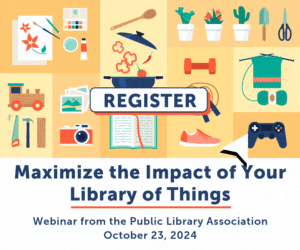An Examined Life
As this is my last column as president of the Public Library Association, I would do myself a disservice if I did not go to the issue that is always on my mind when I speak, mentor, council, or just generally get to talk about what is on my mind.
Let me introduce the topic by going back to my teen years. I was born and raised in Flint, Michigan, and hit my teens in the late 1960s. Funk was everywhere. Charles Wright & the Watts 103rd Street Rhythm Band’s song “Express Yourself” sticks in my mind to this day. There is a line about halfway through the song that says “Some people have everything, and other people don’t, but everything don’t mean a thing if it ain’t the thing you want. Express yourself!”
So now I get to the point. I may have fallen into library work without intention, but I stayed because I love it. There are parts of it that I am really good at and parts that I am not, but there is seldom a day that I do not want to get out of bed and go do it again. I am surrounded by people both in this organization and in others that feel the same way. But I am also realistic enough to know that there are plenty of my colleagues who do not feel that way.
Those people have a thousand excuses for why they cannot go do what they really love. Some of those reasons are more legitimate than others. We all need reminders, however, that this is the only life we get, and rather than making the best of it, we need to make it the best.
Perhaps you are familiar with the phrase opportunity cost, or the measure of any activity in terms of the value of any other activity not chosen. Wikipedia refers to it as the “sacrifice” related to an alternate choice.1 Opportunity cost is assessed not only in monetary or material terms, but also in terms of anything which is of value. For example, if I choose to spend an hour watching some mindless television that I don’t even like, I not only lose that hour, I lose the productive thing I might have done with that hour.
Opportunity cost impacts you and your library in multiple ways. First, by choosing to stay in a career or job that is not satisfying, you choose to limit your time doing the thing you truly love, or perhaps you choose not to even pursue it at all. If you are a comic book artist at heart and choose to sit behind a desk and answer reference questions, you are making a sacrifice—a big one. Secondly, your choice is a critical opportunity cost for your organization. You are taking the position of someone who truly loves this library thing more than anything else, someone who could be an inspiration to your customers and a creative problem solver for your team. Sound harsh? Sometimes the truth is.
There are two things happening in my life right now that make the critical nature of opportunity cost important to me. First, I am only a few years away from transitioning (retiring) into the next new me. While that is a great new adventure, it is the second thing that I want to focus on. In thirty-four years in libraries, I have never had to lay off anyone. Unless something big changes in the next few months, that will no longer be the case. Many of our colleagues, in major urban libraries as well as small rural or suburban systems, have had the same heartbreaking decisions to make. It is painful for the people losing their positions. It is painful for the decision-makers. If there is one small high note that I could encourage the newly laid off with, it would be the clichéd idea that this is an opportunity. Easy for me to say currently, but I have not always played it safe either. Opportunity to disrupt our lives comes from the inside as well. We sometimes choose a new career, a new city, a new partner, new child, elective surgery, you name it; change is not always thrust up on us.
The process of self disruption has many fans in academia, corporate America, and across the blogosphere. From Apple and Dell to entrepreneurs of every type, there are multiple examples of leaders who have taken hold of the creativity that self disruption offers and come out better because of it. It is more than just a matter of rebranding yourself; it is a deeper struggle to identify and grab a hold of your next new creative venture. One of the wonderful things that libraries and their staff do is help people navigate those changes through books, information, and moral support.
Some of you will argue that I make this case to let myself off the hook for the life-changing decisions that are made in the name of bad budget times, but I will argue back that you never have better opportunity to make improvements in your life and self than when life is disrupted for you. The thing that I will not say is that you have to feel good about it. Change is generally painful. Ambiguity can be painful. But if you don’t have a choice, why not embrace all of it and dig in? At the very least, you are a fine example to your family, friends, and colleagues of making the most of what you have. And who knows, there may be a bestselling memoir in there somewhere.
As a part of Grand Rapids Public Library’s annual GR Reads program (whose concept was borrowed liberally from the fantastic programming that the Chicago Public Library does), my library will be promoting a Day of Change this summer. The concept behind it is a simple one: Do something. It could be personal, it could be civic, it could be altruistic, but most important to me is do something important for yourself because “it don’t mean a thing if it ain’t the thing you want.”
REFERENCE
- Wikipedia, s.v. “Opportunity Cost,” last modified Apr. 13, 2012.









